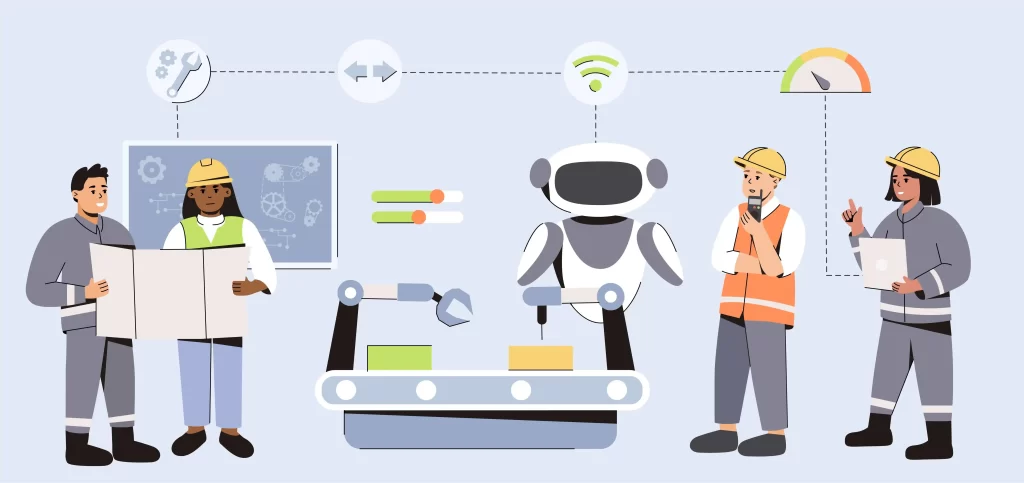The Role of AI in the Manufacturing Space
Author: Laila Meraj
16 August, 2024
The history of the manufacturing industry states it is the backbone of economic development. Since then, it has been going through a major revolution over time. The introduction of Artificial Intelligence (AI) has brought another major revolution in this industry. This involves reshaping the manufacturing processes of how we are understood, implemented, and managed.
This blog highlights the game-changing impact of AI in the manufacturing space, and the innovations driving this evolution.

What Does AI in the Manufacturing Industry Mean?
AI in the manufacturing industry means the use of different Machine Learning (ML) solutions and other Deep Learning (DL) neural networks to efficiently draw the output through task automation. This also involves improved data analysis and decision-making processes because of manufacturing process optimization.
How is AI Implemented in the Manufacturing Space?
AI in the manufacturing space is implemented using ample data which is collected via different sources and then bridged to ML and DL algorithms. With this bridge, all the tasks are automated, and the manufacturing processes become faster, more efficient, and more accurate.
From a technical perspective, there are several steps in the implementation process before using AI in production. These are:
- Collection of the pre-processing data of the manufacturing.
- Prototyping AI models.
- Quality assurance testing of the AI model.
All of the above algorithms are then bridged to various applications for improving the efficiency in the production as well as the overall output.
Use Cases of AI in the Manufacturing Space
AI in the Manufacturing space applies to the following fields of work:
Supply Chain Management
AI integration in supply chain management has revolutionized the industry. Traditional supply chains often grapple with inefficiencies due to volatile global markets. AI addresses these complexities by enhancing operations. The AI algorithms in this space help to analyze vast amounts of data to forecast supply and demand, manage inventory, and optimize logistics.
The implementation of AI in this sector has led to a more flexible and adaptable model capable of responding to market fluctuations and complexities. It also helps in relationship management through the prediction of risks before the happenings and in the identification of possible opportunities for minimizing the cost.
Automation & Robotics
Automation in the manufacturing industry is redefined with the deployment of AI-driven robotics. Cobots, or Collaborative robots with integrated AI capabilities can work with human workers but with more efficient operations, enhancing production and safety.
Tasks with more complexities such as welding, material handling, heavy lifting, and assembly of the items, are performed more precisely by these robots. AI can help these robots integrate new tasks into them with precision and adaptability, making them the most versatile assets in the factory.
The Bridge of Physical and Virtual World
Virtual duplicates of physical assets lead to a concept known as digital twins, which is gaining immense consideration in the manufacturing sector. AI-powered digital twins allow manufacturers to optimize production processes in the virtual environment before implementing them in real time.
Errors are reduced, product development accelerates, and decision-making is enhanced. Updating the digital twin continuously with real-time data can help manufacturers in performance optimization and quick response to the changes.
Sustainability aka Green Manufacturing
Environmental sustainability is important, especially in the manufacturing industry and AI plays a pivotal role in achieving such a goal. AI helps optimize resources, reducing energy consumption, and minimizing waste material. The AI algorithms, as discussed previously, analyze the production data and identify areas where energy consumption can be improved. Additionally, the design of sustainable products is aided by AI to carry out the process in the most eco-friendly way.
Conclusion
Artificial Intelligence is revolutionizing the manufacturing space by bringing innovations that enhance efficiency, quality, output, and sustainability. From supply chain management to workforce automation, AI is a driving force for this smart change. With the adoption of AI, manufacturers in the industry unlock potential growth, possible risk mitigation, and competitiveness in the global market.
AI in the manufacturing space is not just a technology, but an initiative that will decide the future of this industry. Adopting this technology will not just enhance operational efficiency but will pave the path for a more sustainable and intelligent future.
We, at Xorbix Technologies, specialize in AI and Machine Learning software development, providing solutions tailored to manufacturer’s needs. Our expert team can help develop intelligent systems for you and can assist in implementing these AI solutions seamlessly into your manufacturing operations.
Read more on related topics:




